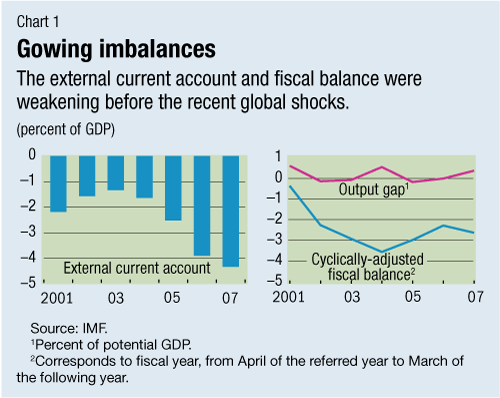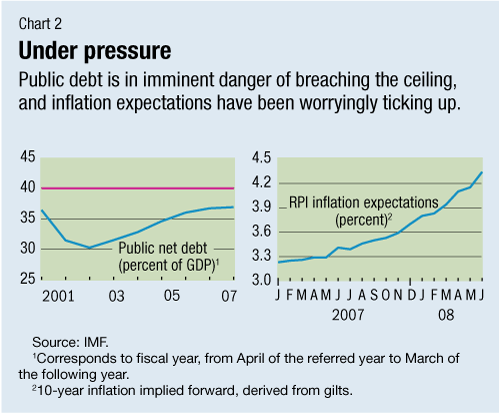
Typical street scene in Santa Ana, El Salvador. (Photo: iStock)
IMF Survey: Twin Global Shocks Dent United Kingdom Outlook
August 11, 2008
- Macroeconomic imbalances, compounded by global shocks, dent outlook
- Private domestic demand set to slow sharply
- Need to safeguard fiscal policy credibility via strong medium-term adjustment
For over a decade, the British economy has had a remarkable run.

City of London, U.K.: inflation already above target, likely to remain so for extended period, IMF says (photo: Alan Copson/JAI/Corbis)
ANNUAL ECONOMIC HEALTH CHECK
Owing to strong policies, years of structural reforms, and some help from benign global conditions, the economy has enjoyed a long stretch of stable growth and low inflation.
But even before the onset of the recent global shocks, macroeconomic strains were developing. Buoyant domestic demand was running ahead of growth, with household savings declining and investment spending edging up.
Inflation expectations were rising and the housing market was overheating. And the headroom under the government's fiscal rules was gradually eroded by sizeable fiscal deficits—despite the fact that the economy was operating close to potential.
As a result of these growing imbalances, the external current account deficit has approached historical highs and net external liabilities have swelled (see Chart 1).

Twin global shocks
The financial market turmoil and high commodity prices have compounded the strains affecting the economy, creating a challenging economic environment. The shock to the global financial system has led to a liquidity crunch that triggered the first bank run in the United Kingdom in over a century, and writedowns and losses by national banks have so far totaled about $50 billion. The impact is most visible in mortgage lending, which has slowed significantly, but banking spreads are also widening.
The spike in global commodity prices has put a further dent in the outlook. This is most apparent in consumer prices. Although core inflation has remained subdued, soaring food and energy prices have catapulted headline inflation to almost 4 percent, putting a squeeze on firms' profit margins and households' real income. The terms of trade shock may also hurt output.
Markets have expressed their concern about the outlook by selling off sterling. As a result, sterling has depreciated by over 10 percent in real effective terms since mid-2007, as risk premiums have gone up.
Policy responses so far
The U.K. government has already taken a number of steps in response to the shocks.
Providing liquidity. Besides broadening its money market operations with extended maturity and collateral, the Bank of England launched a special liquidity scheme in April 2008, allowing banks to swap mortgage-backed securities for treasury bills for up to 3 years.
The liquidity relief provided by the Bank of England has in turn encouraged banks to raise capital. Notwithstanding some difficulties, the aggregate capital raised by the major banks has slightly exceeded their total reported writedowns and losses.
Reforming financial sector rules. Substantive changes to the financial stability framework are under way. With lessons learned from Northern Rock's downfall, the government wants new rules to ensure the orderly and swift resolution of failing banks and increase the coverage and payout speed of deposit insurance. It is also seeking to boost the supervisory capacity of the Financial Services Authority, and provide the Bank of England with a statutory basis for its role in protecting financial stability.
Easing of macroeconomic policies. Interest rates have been reduced by a cumulative 75 basis points since December 2007, and the 2008 budget allows automatic fiscal stabilizers to operate fully.
Slowing down
Although the flexibility of the economy and prompt policy responses by the government will provide some cushion against the ongoing shocks, a significant economic slowdown can be expected. With tight financing conditions, rapidly falling house prices, depressed equity markets and weak real income growth, private domestic demand is set to slow sharply.
While the recent depreciation of sterling has strengthened competitiveness, exports will be held back by softening global demand. Overall, the IMF expects growth to dip to 1.4 percent in 2008 and 1.1 percent in 2009.
The inflation outlook is similarly sobering. As the surge in global commodity prices and the depreciation of sterling continue to work their way through the economy, headline inflation is expected to peak at around 5 percent toward the end of 2008. But continued wage discipline and increased slack in the economy are likely to guide inflation back to the target of 2 percent by 2010.
Tests ahead
The difficult economic circumstances represent a major test to the United Kingdom's much-heralded fiscal and monetary policy frameworks. A protracted breach of the public net debt ceiling of 40 percent of GDP appears imminent, and inflation is already well above target and will likely remain so for an extended period (see Chart 2).

In this context, any steps to loosen the targets on either the budget or inflation fronts would compromise the integrity of the frameworks and the credibility of policies. This would threaten both stability and growth.
On the monetary policy side, attempts to expand the Monetary Policy Committee's mandate or raise the inflation target would do nothing to address the terms of trade losses or lower their economic costs. Instead, policymakers should focus on preventing a wage-price spiral, and continued emphasis on moderation in wage growth will be essential.
On the fiscal policy side, a relaxation of the current framework would undermine the credibility of any new framework. By accommodating a weaker fiscal outlook, it would also constrain monetary policy and compound the external imbalances.
If the debt limit is breached, the credibility of fiscal policy should be safeguarded by adopting concrete plans to return debt below the ceiling in a reasonable timeframe. In that regard, the planned cumulative fiscal adjustment of 1½ percent of GDP over 2009-2012 is unlikely to be sufficient to ensure a reduction of the debt, and more will be needed over the next few years A stronger fiscal adjustment could also facilitate a more balanced policy mix, and help reduce external imbalances.
Comments on this article should be sent to imfsurvey@imf.org


